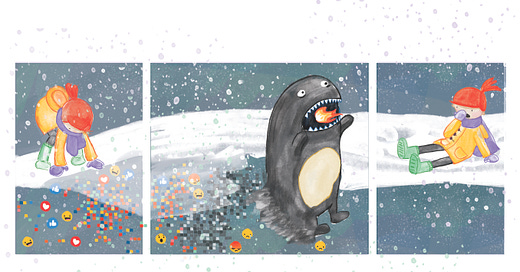No. 77 — Taste ⫶ Books as an act of resistance ⫶ Embarrassingly parallel
A chef once told me that a dish without two different flavors is unlikely to be good
My name is Linda. I write a bi-weekly newsletter about computer science, childhood, and culture.
One area of life where I think algorithms perform exceptionally poorly is children’s media and products. The reward functions of recommendation algorithms get messed up by small people and their obsessive habits, resulting in children being fed noisy nonsense. While I might buy shoes based on an Instagram ad for myself, I almost exclusively skip everything an algorithm suggests for children, however cute the product might look. Most often, these products are of poor quality, the influencers are removed from the real world, and the result is disappointing.
Instead, I rely heavily on a few personal, artisanal, hand-rolled recommendations for children. Kids Book Recs, The Kid Should See This, Austin Kleon’s parenting, Parent(thetical), and more recently, Writ Small are all among the people with excellent taste for children’s products. These sources provide thoughtful, high-quality recommendations that algorithms consistently fail to match.
The prospect of a future where AI customizes movies, games, and graphic design to one’s taste leaves me wondering how we will teach this critical skill to children. The ability to select from a vast pool of possibilities, to describe what one likes and doesn’t like, why something is bad or good, and how to improve from bad to good will be immensely important in navigating a technology-infused children’s media landscape.
For me, living in Paris is an education in taste. Taste is a word that historically has been reserved for things like fashion and art, but here, one must have a taste in bread, architecture, and politics. A chef once told me that a dish without two different flavors is unlikely to be good. Something similar is true in children’s media. Complexity and diversity in content are necessary for quality. Children must learn to appreciate and seek out these qualities rather than passively consuming whatever an algorithm serves them.
Linked List
In computer science, a linked list is a linear collection of data elements whose order is not given by their physical placement in memory. But here it is a selection of things I’ve been reading lately.
Zadie Smith on books as an act of resistance (around the 57-minute mark). She talks about how the Internet makes us worry about everything everywhere, whereas a (fictional) book offers a local, small, and political framework to understand the world. I wish Zadie made more remarks on the Internet (and the Maison de la Poésie is such a wonderful place to visit in Paris; it’s embarrassing I haven’t yet been.)
Speaking of embarrassing - what a lovely word! “In parallel computing, an embarrassingly parallel workload or problem is one where little or no effort is needed to split the problem into a number of parallel tasks.”
NY Times reviews one of my favorite bios, Boel Westin’s Tove Jansson: Life, Art, Words, which is now finally out in English. It is a great summer read, too.
Classroom
I’m hoping to surface and share stories from all of you and I’d love to see your creations! Here are a few teachers using Ruby in creative, fun and inspiring ways.
After last weeks playground update I received this:
Love her concentrated face!
Evan’s moms post includes many great suggestions, but for a rainy summer day, consider printing out the (computer) memory game!








